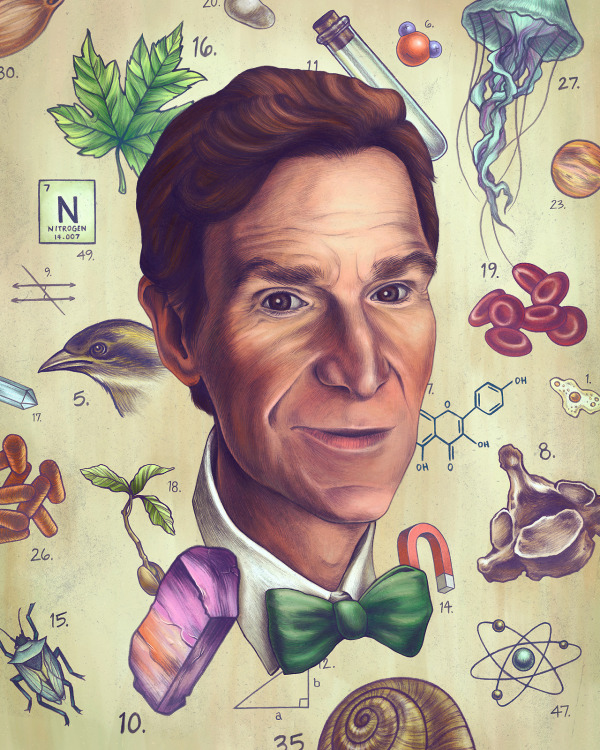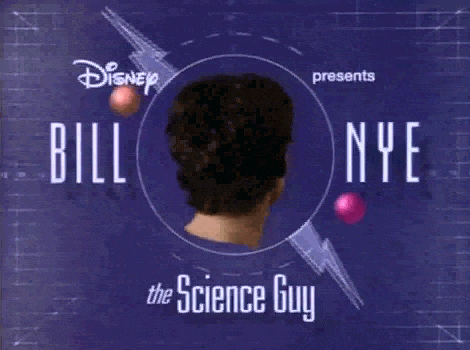Artwork via THE DAILY OMNIVORE
BY JONATHAN VALANIA On November 9th, the Franklin Institute will host a conversation between Maiken Scott, host of WHYY’s The Pulse and Bill Nye, bow-tied science communicator, advocate for reason and critical thinking skills, wouldbe astronaut, bane of creationists and climate science denialists, not to mention superstitious kooks and cranks of every ideological stripe. Recently, we got Dr. Nye on the horn. DISCUSSED: Why he believes in evolution and you should too, Carl Sagan, marijuana, why he wouldn’t sign up for the one-way trip to colonize Mars, why better batteries and sea water de-salinization technology are crucial to the survival of the human race, the moral cowardice of climate science denialism, the societal dangers of literal interpreters of the Bible, whether or not UFOs have been visiting Earth and probing the rectums of rednecks, why GMOs make him nervous, and why he is the U.S. patent holder for the ballet slipper.
PHAWKER: You recently published a book called Undeniable: Evolution and the Science of Creation. Let’s play devil’s advocate and pretend I’m a creationist: Give me your elevator pitch as to why I should believe in evolution.
BILL NYE: It’s not something you believe in or not; it’s a fact of nature. I would ask you, “Why don’t you believe in Evolution? What makes you think that the Earth could somehow be 6,000 years old? What made you think, for example, that a book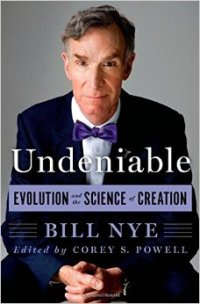 written about 5,000 years ago that has been translated a number of times [and for hundreds of years was stored on nothing more reliable than people’s memories — The Ed.]. What makes you think the information in there is more scientifically reasonable than everything we can observe in nature?
written about 5,000 years ago that has been translated a number of times [and for hundreds of years was stored on nothing more reliable than people’s memories — The Ed.]. What makes you think the information in there is more scientifically reasonable than everything we can observe in nature?
PHAWKER: Every Sunday, my minister says it’s so.
BILL NYE: Well, I strongly encourage you to look at the facts: How could we have light from distant stars that are clearly more than 6,000 light-years away, that are only 6,000 years old? How could we have radioactive elements incorporated in frozen lava flows, if the radioactive elements weren’t chemically the same as the calcium and sodium that they replaced? What entity would rig it up so all of those systems would not work? It’s magical thinking, and I find it completely unreasonable, especially since we’re talking on the phone, which depends in every way on our understanding of science. How can you accept all of this technology without accepting the way that works?
PHAWKER: That’s true. If Alexander Graham Bell was a creationist, we probably wouldn’t be able to have this argument over the phone, would we?
BILL NYE: No. That’s interesting to me.
PHAWKER: One more question in the area of evolution and we’ll move on to some other topics— Evolution seems entirely understandable and reasonable, up until you reduce it to the very beginning. The only difficulty I personally have as far as grasping all of this is, how is it when you go back to the very beginning, to the Big Bang, how is it that something came out of nothing? Which is what happened, according to most scientists. For eons, there was nothing. Then — BOOM! — there was something, which was the beginning of the universe.
BILL NYE: How do you know there was nothing?
PHAWKER: Don’t we have to assume that was the case? Are you saying there’s always been something, the universe has always been here? Is that what you’re saying?
BILL NYE: I’m saying that whatever happened before the Big Bang we don’t understand. We know that something happened before the Big Bang. We just don’t know what that is. But that doesn’t mean it didn’t happen. The fundamental difference between my side of it and the creationist side of it is that just because you don’t understand it doesn’t mean it didn’t happen. Because it’s really hard to get your head around four and a half billion years doesn’t mean there weren’t four and a half billion years [between the beginning of Earth and now]. There were four and a half billion years. The thing about science is that we don’t know drives us forward, instead of making us cower in the corner.
PHAWKER: Good point. Moving onward. You have applied to NASA repeatedly over the years to become an astronaut. Do you think the future of space travel lies in the private sector as opposed to the public sector?
BILL NYE: Let’s keep in mind the company SpaceX. Space Exploration Technologies Corporation. They recently signed a contract with the United States government for $2 billion. Yes, they’re a private company, but they’re supported by tax dollars, in the same way that McDonald Douglas and Boeing and Lockheed Martin are supported by tax dollars. There’s just a new kid on the block with a visionary leader, which is the new thing that SpaceX brought to the party. The guy who says he wants to die on Mars. I’ll remind us all that whether it’s Magellan, Columbus, Lewis and Clark, Armstrong and Aldrin— all of those people were paid for by the government. In history, the exploration is done by the public sector. The, for lack of a better term, the resource extraction is done by the private sector. This is not a new model.
PHAWKER: Would you sign up for the one-way trip to Mars?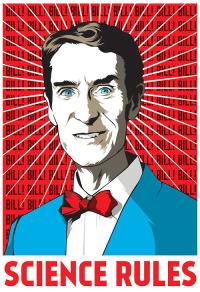
BILL NYE: Absolutely not.
PHAWKER: Because?
BILL NYE: People have a fundamental lack of understanding of Mars. That’s all I can tell you. Where I’d like to start with this conversation is, do you know the motto of the state of California? It’s “Eureka… I have found it.” European settlers went over the hill in Sacramento, and there’s fish longer than their arm — Salmon — swimming into your lap. All the protein you could possibly want. Orange trees are growing like weed in the valley. Even the rocks are made of gold. On Mars, it ain’t like that. There’s no vitamin C. There is hardly any water, and what you will find will be extremely brackish and frozen. The other thing is, as soon as you open your spacecraft door, you will notice right away that you can’t breathe. The people that have this romantic notion of pioneering on Mars, I think, have a fundamental lack of understanding of what they’re dealing with. With that said, I could go to Mars back and forth in a heartbeat look for signs of life.
PHAWKER: You think this notion of trying to colonize Mars is a fool’s errand?
BILL NYE: Absolutely. [The Earth] is it. The Earth is where we fit in. This is how it plays out, in our ecosystem, on Earth. Let’s see if we can get this planet squared away before we go trying to make another planet like the Earth, a place with no water, whose atmosphere has been stripped off by the solar wind, where there’s hardly any air. It’s not our air. It’s Martian air. We can’t breathe it. Furthermore, it’s 40 below most of the time, in most places. It’s just not a suitable place.
PHAWKER: You’ve stated previously that two of the most crucial things to sustaining life on this planet at this moment is inventing a better battery, and finding a low-cost and low–energy way to desalinate water. Explain to me why.
BILL NYE: When I was a kid, there were fewer than 3 billion people in the world, and now there over 7.2 billion. That’s the problem. There’s 7.2 billion extracting the resources at the rate that we did two centuries ago. There are not enough resources to extract, and we still do it. The resource that’s really going to be short is fresh water. In the ocean, like it says in “The Rhyme of the Ancient Mariner,” “Water, water, every where, nor any drop to drink.” You can’t drink salt water, you can’t use it to water crops. If we had sources of fresh water that were not as energy-intensive, it would change the world. 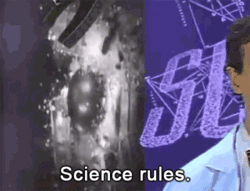
PHAWKER: So that’s where we’re at right now? The de-salinization technology exists, it just isn’t scalable to do globally?
BILL NYE: It takes a tremendous amount of energy, and where do you get the energy? You can distill water. People distill water constantly. But the problem is enormous, and as the climate changes, our arable land is going to change, also. We’re gonna have to find ways to get fresh water to these new places. When you look at it, the situation we’re in now — it’s impossible. Billions of people are going to suffer enormously. There’s two technical things that would change the world: potable water, and an electricity storage system that is scalable.
PHAWKER: Moving forward, you mentioned climate change. A hundred years from now, do you think history will divide the climate-science deniers into two camps: those that were simply cynical and had a vested financial interest in the status quo, and those that lacked the critical thinking skills to be able to puzzle through this issue properly? Does the climate denialist argument come down to those two things: Either cynicism or ignorance?
BILL NYE: Well, yeah. But ignorance is fueled by the cynics. The fossil fuel industry has worked very hard to introduce the idea that scientific uncertainty is the same as doubt. That’s not right. The fossil fuel industry has maybe not been a conspiracy, but there are enough like-minded people that are able to sway public opinion. It’s interesting to note that the scientific consensus on climate change is, by reasonable reckoning, ever so slightly stronger than the scientific consensus on the connection between the connection of cigarettes and cancer. The fossil fuel industry is employing the same deniers that were employed [to deny that cigarettes caused cancer] in the 1960’s, who are well into their 80’s, now. But they’re still working and, by any reasonable reckoning, leaving the world a worse place than they found it.
PHAWKER: You are a UFO skeptic, is that correct?
BILL NYE: Absolutely. There used to be a joke in television news, a very popular joke among photographers, “Yeah, I sure hope I’m there to see that car wreck.” In other words, trying to record a car wreck is considered an impossible task, because you’re not gonna be right there, ready at the exact moment. Now, there are hundreds of car wrecks posted online every hour, because there are so many cameras. These photographs are taken every day, billions and billions. There’s not one UFO there, not one. I’m not saying that there aren’t things that astronomers don’t know what they are right away, but we haven’t been visited by aliens who have affected five percent of the population, and no one else noticed. That’s not what went down.
PHAWKER: By the same token, as you pointed out, we are, when you get right down to it, made out of stardust. Is it possible, though, that life on Earth was actually seeded by a more intelligent species?
BILL NYE: If that happened, it would be an extraordinary thing to investigate. In order to investigate, there would be two places I’d want to go: Mars and Europa, the moon of Jupiter. It has twice as much seawater as the Earth. Without those missions, it’s pure conjecture that you can’t prove a negative, and so on. 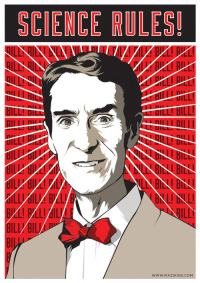
PHAWKER: What would you want to investigate the moon of Jupiter and Mars that would prove this theory that life on Earth was seeded by aliens is either right or wrong?
BILL NYE: There has been liquid seawater on Europa for 4.6 billion years, who knows what we would find. Maybe there will be [life forms] on Europa. If there are, are they like us? Do they have DNA? Are they a completely different race? On Mars, is there a place near the equator where the soil-ice is warmed? Is there a place that gets slushy on a Martian summer day, and we could we go there with the right instruments and detect something like an ancient Martian microbe? Or a fossilized microbe, or maybe there’s something still alive on Mars. Is that thing eking out a living on Mars like us? Did life start on Mars three billion years ago when Mars was very wet? Did Mars get hit with a massive asteroid and fall to the Earth’s orbit, and we are all descendants of a Martian microbe? That is a question that I would like to answer as a voter and taxpayer, let alone as a human. This is where I’d like us to invest some of our intellectual treasure.
PHAWKER: A lot of people have, in my estimation, a very Pollyanna-ish view of reality, and insist that science and religion are compatible, but is it not true that when you reduce it down to the core, science renders religion irrelevant?
BILL NYE: Well, I don’t know. For me, that’s an unanswerable question. However, I embrace the idea that billions of people around the world have their lives enriched by their religions. They have a great sense of community, they support each other, they share resources. I completely understand that. However, no matter what you believe in, no matter what you hold to be true, and no matter what entity is near you, the Earth is not 6,000 years old. Can’t possibly be 6,000 years old. If you think the Earth is 6,000 years old, then I strongly suggest you question your religion. Something’s wrong with it.
PHAWKER: You took classes from Carl Sagan back at Cornell, when you were an undergrad. Sagan was was famously a proponent of marijuana legalization. I’m wondering what your thoughts are on marijuana from a personal and scientific perspective.
BILL NYE: Personally, it’s not for me. I just don’t like the smell, I have to tell you. I just don’t like it. It’s just more smoke, and it gets in your clothes. It’s not for me. I saw ads; I was in Oregon recently, in Portland, which is right near the border of Washington state. I saw ads for the midterm elections where an elected official was saying, “It’s working in Washington,” meaning, he claimed on the ad, that there’s fewer driving and drug culture arrests, and less squandering tax resources on arresting people for not doing anything at all, except for ingesting marijuana. Not robbing banks, not robbing stop signs, just having it. He claims in this ad, that there are lower law enforcement expenses in Washington. There are more resources to improve the quality of life for Washington citizens. This is probably true. If we pass marijuana, and at the same time provide additional education, the same way we have education restricting the use of alcohol, it seems like a reasonable course forward. But then again, its not all or anything, it’s details. But marijuana is not for me. Dr. Drew Pinsky, who I interviewed years ago, at that time, he insisted that marijuana was an entry drug that leads to other drugs. I don’t know if that’s true. If marijuana were legal, I’m not sure that it would necessarily lead to other drugs.
PHAWKER: I know for a fact the marijuana-is-a-gateway-drug theory has been fairly conclusively disproved. Moving onwards, two more questions. By the way, where are you calling me from? Are you out on the road?
BILL NYE: I’m in New York, in my apartment.
PHAWKER: Is that where your primary residence is?
BILL NYE: Yeah, New York.
PHAWKER: Your position on GMO’s has been criticized as inconsistent with your positions on climate change and evolution, in that both of the latter are informed by the Scientific Method but your objection to GMOs is not. Some people working in these fields have called you out on this. What’s your response to this?
BILL NYE: Genetically modified organisms are designed to address the problem of production, of producing a great deal of food for a growing population. Our problem is not food production; it is distribution of healthy food. This is where these issues get tangled, and the line we draw is between what consumers want and what consumers will fund with taxes. You can predict that there will be extraordinary amounts of food in the upcoming decades, but you are not sure you can prove that the kind of food we’re producing now is what we need in the coming decades.
Although I completely agree that we can understand how we modify organisms, and the scientific evidence that there’s nothing wrong with eating those organisms is overwhelming. You can eat all the genetically modified corn, soybean and papaya that you want. But what you cannot know is what happens to the ecosystem you grow it in — these enormous monocultures that we have fostered through the production of genetically modified organisms that are sold by private industry. We may be headed for a farming, if not a disaster, an enormous problem that we created through overproduction of a single type or types of crops. By and large, the trouble with GMO’s is that they’re complicated. I acknowledge that you can eat the organisms, I acknowledge that you can understand exactly what happens in the organism, but I do not agree that eight or 20 growing seasons down the line that you can know what happens to the ecosystem that sustains it. By way of example, I’ll give you the Monarch butterfly. In certain regions, we’ve inadvertently decimated their population, because we killed the milkweed, by accident, with factory farming herbicides.
PHAWKER: To follow up on your first point about ecosystems, the people on the other side of the debate would argue that we disrupt ecosystems all the time in dozens of ways, yet life still goes on relatively the same.
BILL NYE: You can say that, but we are living an age of mass-extinction that is being brought on by people. It’s not exactly a thing to be proud of. We screw up ecosystems all the time, we spill oil everywhere, we destroy aquifers with reckless fracturing of coal. It’s not something I would brag about.
PHAWKER: Let me ask you about that. What is your take on fracking?
BILL NYE: It’s very personal for me. My uncle worked as a geologist. He worked for DuPont Dynamite for 30 years. Then, instead of retiring, he started his own blasting business, which is still thriving in Kansas City. He was a character. He was a raconteur. He told stories of fracking wells by dropping cans of nitroglycerin down there. [laughs] He was fracking in the early days, and there’s a device called a torpedo, which is a two and a half inch pipe, four and a half feet long, that they would fill with nitroglycerin. [laughs] It’s cold, very cold. But they would use dynamite, and they would set it off electrically. It’s a two and a half inch diameter, four and a half foot long piece of dynamite at the bottom of a well, straight down. That’s how he would fracture the rock, because it gave a little more production out of oil and gas wells, right? 
Well now, people were able to drill horizontally under other people’s land, fracturing their rock hydraulically with water pressure. Incidentally, it was discovered during the civil war, with bombardments in rivers. Fracking in itself, not to put too fine a point on it, is not inherently bad. But unregulated fracking is. The example I’ll give you is that if you were in the sandwich shop, a delicatessen, on a Saturday with your kids, and they recklessly play with their food, and start poking a straw into the sandwich. If you want to get the pastrami or the cheese out of a grilled cheese sandwich, you can get a little bit by poking the straw straight down. You get a little slug of cheese and bread, the size of a pencil, at least. It takes you a long time to get much cheese, right? But if you’re allowed to get through the sandwich sideways, horizontally, parallel to the table top, you can get all the cheese in no time, and that’s what’s happening now in fracking. It’s a lack of regulation that is bad, not the idea itself. Regulation requires a government. We have people now who run for elected office, who don’t like government, who want to shut the government down. Imagine if you took a job in Boeing, and you felt that your main goal was to shut it down and drive them out of business. What kind of employee would you be? Until the pendulum will swing back, and people start electing people that are a little more focused on the public good, but it’s gonna be a while. But I’m not saying it can’t be done. The pendulum’s swung and swung. We’ll see what happens.
PHAWKER: The fossil fuel energy industry always insists that they cannot reveal what chemicals they are in fact pumping into the Earth as part of the fracking process, because that’s proprietary information. What do you say to that?
BILL NYE: Proprietary, schmietary. It’s regulated. We have to have regulations. I guarantee you, there are countless patents in [automobile] fuel injection systems. But we nevertheless regulate car emissions. Just because you want to protect your recipe for fracking fluids doesn’t mean we have to have natural gas coming out of people’s sinks.
PHAWKER: You think that gas drillers are being sincere and they are really worried that somebody is going to steal their fracking formula and eat their lunch, or is that really just a way of hiding horrible things you are doing to the water supply?
BILL NYE: You can’t argue that you’re allowed to pollute in the name of patent rights.
PHAWKER: You mention patents, which brings me to my final question. It’s my understanding that you hold a US patent for a ballet shoe, is that true? How and why?
BILL NYE: Yes, it’s a true fact. We did a Science Guy show on bones and muscles. [sings] Bones and muscles, bones and muscles We went to the Pacific Northwest Ballet in Seattle, which is a very well-respected ballet company. They were here in New York two weeks ago. Anyway, there were all these young women with these crazy injuries. They all went to the same surgeon, an orthopedist for the Seattle Seahawks. So you had people 22 years old with all of these scars and stuff from surgeries. I just figured there has to be a better way. The toe shoe hasn’t changed much in a couple of centuries, so I just messed around with it. Because I like the ballet, I just do. I just think it’s beautiful.
BILL NYE WILL DISCUSS HIS LATEST BOOK UNSTOPPABLE AT THE FRANKLIN INSTITUTE ON NOV. 9TH @ 7PM

